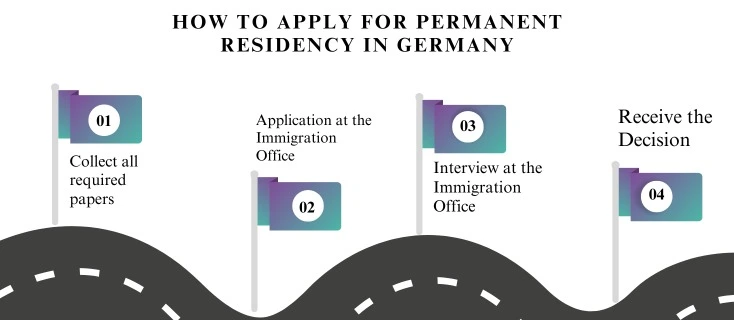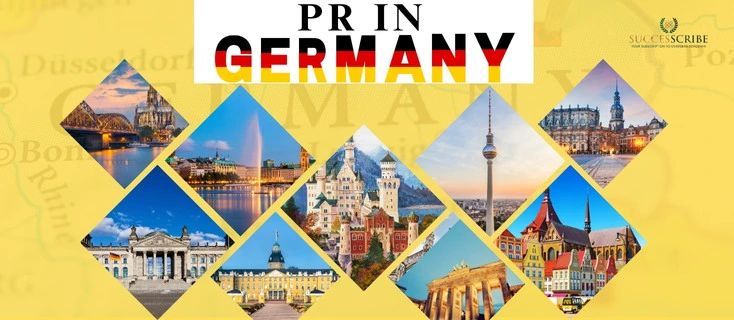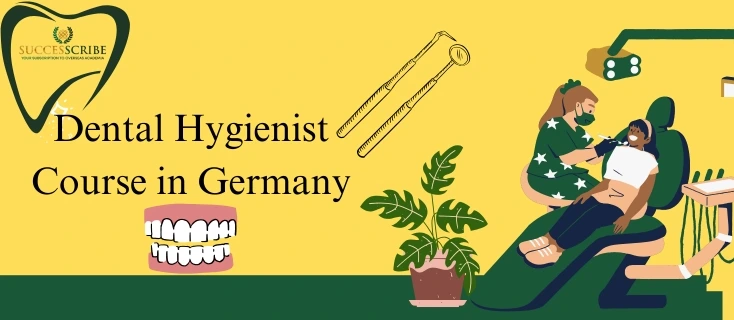Germany is a country that has a great economy, superior education, and a good standard of living. Due to these characteristics, many people around the world wish to be seen moving to Germany for work, study, or any other purposes. Over time, some of these movers and shakers will be interested in making Germany their permanent home. To do this, many people opt for the acquisition of Permanent Residency, or Germany permanent residency status. In this comprehensive guide, Successcribe – leading German education consultants will explore the various pathways, eligibility criteria, benefits, and processes involved in acquiring PR in Germany.
What is Permanent Residency in Germany?
Permanent residency is also known as a Settlement Permit (Niederlassungserlaubnis), and it gives the non-EU national the right to an unlimited stay in Germany to live and work. It extends rights on a par with those of the German citizens, except for the right to vote. Such status attracts people who have stayed in Germany for more than a few years and wish to settle without time restrictions of the visa or temporary residence permit.
Pathways to Germany Permanent Residency
The different ways an individual can acquire PR in Germany depend on the specific situation. There are mainly three popular avenues: work, education, family, and asylum, which would be the last but an avenue for someone who would be looking for asylum. Every avenue has its conditions for application, but they all lead to one goal: Permanent Residency.
1. PR in Germany through Employment
Usually, individuals get German permanent residency through employment. Non-EU citizens who have been working in Germany for sometime and are in line with other requirements are eligible to apply for a Settlement Permit. Here’s how it works:
Eligibility Criteria
- You should hold a valid Blue Card or be allowed to work in the country for a specified period.
- Proof of 33 months of employment in a qualified position. In certain cases, this period may be reduced to 21 months, if you possess adequate German language skills at level B1.
- Sufficient contributions to the statutory pension insurance for the required duration
- Basic knowledge of the German legal and social system
- Adequate living space and proof of financial self-sufficiency.
In certain cases, professional workers can get PR without waiting for 33 months by having exceptional professional experience or being needed by the economy.
2. PR in Germany through Education
Another way of obtaining permanent residency in Germany is through education, mainly from international students. Students who have passed a degree course at a German university can apply for PR after staying in Germany for sometime.
Eligibility Criteria
- Graduation from one of the recognized German universities
- Two years of full-time employment related to the study.
- Proof of financial independence and contributions to the pension system
- Basic knowledge of the German language, usually A1 or A2 but B1 is preferred.
Germany gives you an 18-month Job Seeker Visa when you have passed your studies successfully, it helps you find a job in your field, and then you can get permanent residence .
3. PR in Germany through Family Reunification
Germany provides the family reunification program in which it welcomes the family members of people who are staying in that country and join them. Spouses and children can apply for permanent residency if they live there for a number of years and get married to either a German citizen or resident.
Eligibility Criteria
- Marriage certificate or some sort of proof that exhibits blood relationship.
- He must have residence in Germany with a valid residence permit.
- Basic knowledge of German Language. Most of the spouses need to exhibit having A1 level of competence in German.
- Financial self-sufficiency and proper accommodations.
- Husbands and wives of German citizens are also eligible for PR if they have married in Germany and have lived there lawfully for at least three years.
4. PR in Germany for Self-Employed Individuals
The Land of Innovation- Germany encourages entrepreneurship, and even the self-employed are allowed to obtain PR if a successful business is established in Germany.
Eligibility Criteria
- A flourishing self-employed business in Germany for at least three years.
- Evidence of sustainable income from the business.
- Adequate pension plan or equivalent financial security.
- A2-level German language skills or higher.
Advantages of Germany Permanent Residence
In return for obtaining PR in Germany, one gets the most repute status by being in the country and contains several benefits such that it gives plenty for the citizens to achieve:
- Unrestricted Right to Work: It provides unrestricted Right to Work, with all sectors and professions open to permanent residents without any need for any additional permit or restriction.
- Social Security Benefits: The full range of social benefits offered by Germany to its citizens can be enjoyed by PR holders as well, in the form of health insurance, unemployment benefits, and pensions.
- Freedom of Movement within the EU: Since permanent residency does not grant the same level of freedom of movement as German citizenship, residents may still travel around the EU on short visits, study, or conduct business.
- The Pathway to Citizenship: Often residence leads to the acquisition of German citizenship. After many years of residence, PR holders can apply for naturalization.
- For Access to Education: The permanent residents can access university education in Germany at the same level as that of German citizens, which is very beneficial for families with children.
- No Need to Renew a Visa: Unlike temporary residence permits, PR status is not time-bound and renewed periodically. This saves valuable time and emotional trauma.
How to Apply for Permanent Residency in Germany

The following are the procedures applied in making an application for PR in Germany:
- Collect all required papers: Generally, before commencing your procedure, you would have to provide:
- Valid passport and residence permit.
- Proof of employment through an employment contract or pay slips preferably.
- Be able to show that when working you have been paying into pension schemes.
- Health insurance coverage.
- German language proficiency certificate.
- Rental agreement or documentary evidence of the ownership.
- Financial statements showing that you’ll be able to support yourself.
- Application at the Immigration Office: Once you have all of these documents, apply for an appointment at your local immigration office. One has to prepare well in advance since processing is not short.
- Interview at the Immigration Office: During the said appointment, one is compelled to produce all your documents, explain your residence and also show that he or she understands German law and society.
- Receive the Decision: After processing your application, the immigration office will either approve or decline your application for PR status. If approved, you are then issued with a Settlement Permit (Niederlassungserlaubnis), that renders one eligible for permanent residency in Germany.
Germany Permanent Residency vs. Citizenship
Even though Germany permanent residency contains many rights and privileges, permanent residency status is not identical to full German citizenship for several reasons:
- Voting Rights: Permanent residents are prohibited from voting in national elections for Germany or EU elections. To exercise full voting rights, citizenship is needed.
- Passport: PR holders maintain their original nationality and passport; naturalized citizens are provided with a German passport.
- No Dual Citizenship in Most Cases: While Germany allows dual citizenship in some cases, the most prevalent form of dual citizenship, that which non-EU nationals apply for to gain permanent residence status, does not allow dual citizenship. Permanent residents can retain another nationality, even while living in Germany.
How Long Does it Take to Obtain Permanent Residency in Germany?
How long does it take to gain PR in Germany? Time Spent may Vary depending on your situation:
- Blue-card holders: three years of employment-if the proficiency level in the language is a good one-than after 21-33 months
- Graduates of German universities: Two years of full-time employment in Germany earns them the entitlement to apply for permanent residency.
- Family members of German Citizens: usually after three years of marriage and residence in Germany.
- Entrepreneurs/Entrepreneurial People: After three years of effective operation of business ventures.
Germany Permanent Residency for EU Citizens
Citizens of the EU/EEA and Switzerland are all free to move around in the EU; therefore, they do not need to submit applications for permanent residence in Germany. EU/EEA nationals and Swiss citizens, after five years of uninterrupted residence in Germany, they can obtain a certificate of permanent residence. This paper is not required but is helpful to those in some legal cases.
Problems and Tips for PR Applicants
While the process to obtain Germany permanent residence is not cumbersome at all, you may face a few difficulties in the process:
- Language Standards: One of the greatest hurdles for PR applicants is to develop the desired level of German language proficiency. It would be a wonderful idea to start learning German as early as one can, especially if you are aiming to get PR through employment or family reunification.
- Financial Independence: Demonstrable financial independence may be a huge issue, especially for students or for those who are self-employed. Make sure you can prove that you have sufficient savings or business income before applying.
- Documentation: Failure to provide proper or complete documentation could prolong your application. Check everything pertinent and submit together with all the required documents.
Conclusion
Now, some of the benefits associated with permanent residency in Germany include job security and many social benefits, and it is a good choice for people who will stay in the country long term. Be you a student, employee, entrepreneur, or just a family member, there is an opportunity for multiple pathways to Germany permanent residency, each having its specific requirements. Only once you understand the process, prepare your documentation, and meet the eligibility criteria, will you be able to successfully apply for PR in Germany and enjoy your time in one of the world’s most prosperous and welcoming countries.
Related Post
Best courses to study in Germany
How to study in Germany for free
English taught public universities in Germany
Bachelor in Computer Science in Germany











